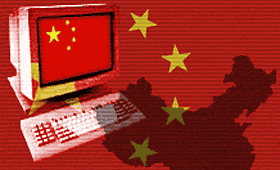The South China Morning Post’s Eva Li reports on updated regulations from the Cyberspace Administration of China which will consolidate state control over online news and require all news distributors to obtain an official license. The new rules are set to go into effect on June 1, and are the latest of several CAC measures to reinforce central control over online news.
[The first comprehensive revision of the regulations in 12 years … i]t incorporates a collection of piecemeal documents and groups them together to provide a clearer scope of the restrictions.
It also provides clearer definitions of which media would require licences for distributing news. They include “websites, applications, forums, blogs, microblogs, public accounts, instant messaging tools and internet broadcasts”.
[…] It remains to be seen if the move signals a crackdown on public accounts of instant messaging platforms. [Source]
More on the online news regulations from the BBC:
The legislation will bring online news providers into line with traditional news media operating in the country.
From 1 June, when the rules come into force, they will be expected to follow “information security protocols”, including “emergency response” measures such as increased vetting following disasters, according to the state news agency Xinhua.
[…] In a statement published online, the Cyberspace Administration of China (CAC) said the new rules would “strengthen management of information” and “promote the healthy and orderly development of internet news, in accordance to law”.
[…] Organisations that do not have a licence will not be allowed to post news or commentary about the government, economy, military, foreign affairs, or “other areas of public interest”.
Editorial and business operations must be kept separate.
Only publicly funded organisations will be able to carry out their own reporting. [Source]
State media’s coverage of the online news regulations note that they will make the Cyberspace Administration of China (CAC) “the new regulator of online news service, replacing the State Council Information Office.” Founded in 2014, the CAC is directly led by President Xi Jinping, and has been described as “an important pillar of China’s IT-backed authoritarianism.” China Media Project’s David Bandurski notes that the rules on online news were one of three seperate regulations unveiled by the CAC yesterday, all set to take effect in June alongside the recently passed and highly controversial Cybersecurity Law. Bandurski highlights how these new regulations, and the continuing consolidation of control over China’s internet under the CAC, represent the maturation of Xi Jinping’s greater vision for information control in the digital age:
These regulations, which will formally take effect on June 1 along with the Cybersecurity Law, mark the maturation of President Xi Jinping’s grand plan for information under the Chinese Communist Party in the 21st century. That vision centers on 1) cybersecurity as integral to national security, and grasps cybersecurity through the lens of regime stability and the core need for information controls at home and abroad, and 2) informatization, or xinxihua (信息化), the idea of internet and digital development as the new, perhaps even now primary, source of production, replacing industrialization at the heart of the national economy.
Xi Jinping fleshed out this vision when he addressed the very first meeting of his Office of the Central Leading Group for Cyberspace Affairs (中央网络安全和信息化领导小组) in February 2014, speaking about the need to fashion China as an “internet power” (网络强国). In that address, Xi said: “Without cybersecurity, there is no national security; without informatization, there is no modernization” (没有网络安全就没有国家安全,没有信息化就没有现代化).
[…] Xi Jinping has progressively pulled the internet front and center, and the creation of the Central Leading Group for Cyberspace Affairs, the body that subsumes the CAC, and of which Xi is head, is an institutional reflection of this dramatic change. Since the formation of the Leading Group and the CAC, Xi Jinping has stressed the need for these newly centralized controls on the internet to be further legitimized through laws and regulations. China must, he says, “govern the online space in accord with the law” (依法治理网络空间).
[…] Xi Jinping’s cyber regime is still in formation. But we can be sure that as the news in China increasingly goes digital, and as television goes mobile, the CAC’s power will grow. Its web of controls, almost assured to be one of Xi Jinping’s most enduring legacies, will overlay China’s 21st century web of communications. [Source]
As the CAC shores up domestic authority over content within the Great Firewall, authorities have also taken steady measures to limit access to the global internet by making the use of virtual private networks (VPN) services increasingly difficult.







